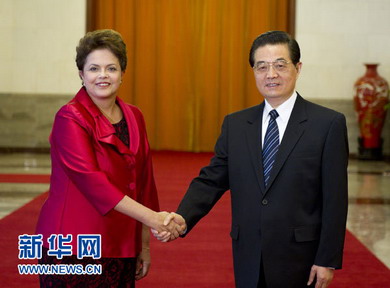|

On the afternoon of April 12, 2011, President Hu Jintao held wide-ranging and fruitful talks in an in-depth, friendly manner with Brazilian President Dilma Rousseff at the Great Hall of the People. Both sides reached broad consensus on a series of major issues including furthering bilateral ties.
Hu said since the establishment of strategic partnership in 1993, especially in the new century, China-Brazil relations have entered a new stage of comprehensive, rapid and in-depth development, with close high-level exchanges, improving dialogue and cooperation mechanism and deepening political mutual trust. Both sides have reached one new high after another in the bilateral trade and made positive progress in relevant major cooperation projects and pragmatic cooperation in all areas. The two countries have also kept sound coordination and cooperation in global issues. "China-Brazil strategic partnership has become an example for South-South cooperation and has greater global influence and strategic significance," said Hu.
Rousseff said Brazil attaches great importance to developing relations with China and Brazil-China strategic partnership is of great significance. To establish and develop strategic partnership with China is a strategic choice of Brazil. In recent years, bilateral ties have entered a new stage of development and the friendship between both peoples has been increasing with fruitful and closer cooperation in all areas. Both sides have kept close high-level contacts, seen a strong growth in economic and trade cooperation and enhanced coordination and cooperation in multilateral organizations and international affairs. Brazil-China cooperation has contributed to the development of South-South cooperation.
Hu said currently both China and Brazil are at an important stage of development and face similar opportunities and challenges. China is ready to work with Brazil to further deepen and develop bilateral ties mainly in the following four aspects in a bid to contribute to economic growth and improvement of people's livelihood in their respective countries. First, adhere to equal consultations and deepen strategic mutual trust. Hu urged both sides to maintain exchanges at high and other levels, give full play to the role of China-Brazil High-Level Committee, strategic dialogue and other dialogue mechanisms. The government agencies, legislative bodies, political parties and localities of the two countries should expand exchanges and cooperation. Second, adhere to mutual benefit and uplift the level of cooperation. Hu called on the two countries to further implement their Joint Action Plan, maintain sound and steady trade growth and promote cooperation on economy, trade, investment, energy, mining, infrastructure construction and finance. Third, adhere to mutual complementarities of advantages and expand cooperation on science and technology. Hu called for stronger cooperation in areas like agriculture, new energy, biotechnology, nano technology, information technology and space technology. Fourth, adhere to mutual exchange and consolidate the social basis. Hu suggested both sides expand exchanges and cooperation on culture, education, public health, social security and poverty alleviation and increase friendly contacts between the press, academic and sports circles as well as the youth of the two countries to make China-Brazil friendship more deeply rooted in the hearts of both peoples.
Rousseff fully agreed with President Hu's important proposals on furthering bilateral ties, saying Brazil is ready to keep closer bilateral strategic partnership, make their partnership assume increasing strategic significance, tap the role of Brazil-China high-level committee and promote exchanges and cooperation in such areas as trade, investment, finance, technology, agriculture, infrastructure, mining and culture so that "Brazil-China ties could see a qualitative leap".
China and Brazil have extensive common interests on major international and regional issues and shoulder increasingly more common responsibility, said Hu. Hu said that China would enhance strategic coordination with Brazil in international affairs and better deal with global challenges like climate change and sustainable development in a bid to push forward the world political and economic order in the direction of benefiting the developing countries.
Rousseff said her country would like to see more coordination with China on such issues as trade, finance and environmental protection as well as within the framework of such multilateral organizations like the United Nations and the G20. She said the two countries should make joint efforts with other developing countries to make contribution to promoting multilateralism and sustainable development, safeguarding world peace and establishing a just and equal world order.
Following the talks, the two heads of state signed a joint communiqué between the two countries and attended a signing ceremony of bilateral cooperation documents.
Prior to the talks, President Hu hosted a welcome ceremony for President Rousseff's visit at the North Hall of the Great Hall of the People. Vice Chairman of the Standing Committee of China's National People's Congress (NPC) Chen Changzhi, State Councilor Dai Bingguo, Vice Chairman of the National Committee of the CPPCC Li Jinhua, Vice Chairman of Central Committee of China Zhi Gong Party Wang Qinmin, Foreign Minister Yang Jiechi, Chairman of the National Development and Reform Commission Zhang Ping, Minister of Industry and Information Technology Miao Wei, Minister of Commerce Chen Deming and Chinese Ambassador to Brazil Qiu Xiaoqi attended the welcome ceremony.
|